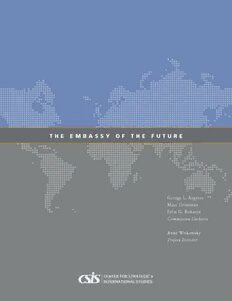
The Embassy of the Future PDF
88 Pages·2007·2.321 MB·English
Most books are stored in the elastic cloud where traffic is expensive. For this reason, we have a limit on daily download.
Preview The Embassy of the Future
Description:
The truest test of the value to our nation of the U.S. diplomatic presence abroad is whether the people we ask to represent us effectively promote American values and interests. Diplomacy is a vital tool of national security. The aim of this report is to make the diplomatic pursuit of U.S. interests abroad even more effective than it is today. Our diplomats and those who support them must have the right tools and capacity to do their work. This is an urgent national priority. Transnational threats, including terrorism, put U.S. citizens and national interests at risk. Potential competitor nations are emerging on the global stage. Anti-Americanism can have lethal consequences for our nation and its citizens. Operating in a higher threat environment is part of today s diplomatic job. Traditional diplomacy where government and social elites interact in highly formal channels is being transformed. U.S. diplomats will still need to influence foreign governments, but increasingly they will work directly with diverse parts of other nations societies. The Embassy of the Future Commission envisions an embassy presence in which U.S. officials reach out broadly, engage societies comprehensively, and build relationships with key audiences effectively. This project is called the Embassy of the Future, but embassy is meant in a broad sense, of which embassy buildings are only one dimension. The commission underscores that the U.S. presence and our diplomacy are about our people Foreign Service, Civil Service, Foreign Service nationals and other locally employed staff and their capacity to carry out their mission. We want to empower U.S. diplomats to succeed in the work they do for America. Modernization and reform of the diplomatic profession and its infrastructure have begun. But the State Department must do more. The department needs more people and a well-trained workforce; modern technology that will expand diplomatic capacity and reach; policies, communications tools, and resources that support mobility outside embassy compounds; platforms that serve mission effectiveness; and a risk-managed approach to security that allows for the interactions in the field required to achieve successful diplomatic engagement.
See more
The list of books you might like
Most books are stored in the elastic cloud where traffic is expensive. For this reason, we have a limit on daily download.
